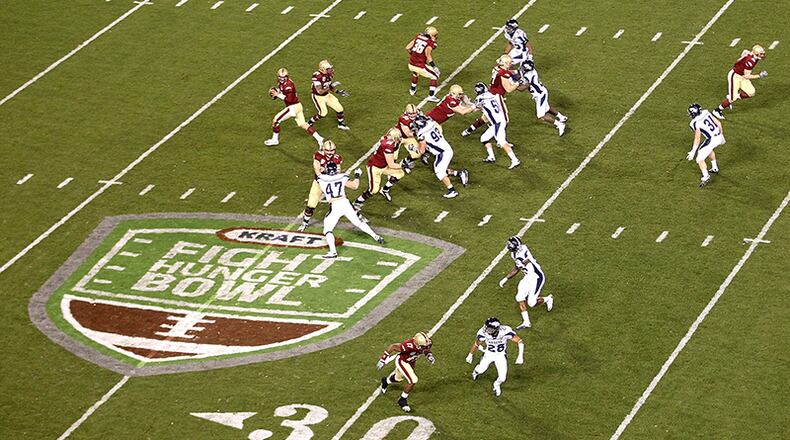With an emphasis on destination diversity and expanding West Coast markets, the Big Ten and Pac-12 are strengthening their traditional ties with a pair of matchups in California bowl games.
The Holiday Bowl in San Diego and the Kraft Fight Hunger Bowl in the San Francisco Bay Area announced six-year agreements Monday for teams from each conference to play each other starting in 2014.
Pac-12 Commissioner Larry Scott and Big Ten Commissioner Jim Delany said the new configuration will also help avoid repeat matchups and teams returning to the same region frequently.
While the Pac-12 has a slotted selection order, Scott said the conference has "mechanisms" in place to allow for flexibility. Delany said the Big Ten is not locking in a selection order with its bowl partners but will have three tiers of bowl games where teams can be placed depending on their regular-season records.
"We're working with the bowls to create what I would describe as a process for selection and approval by each bowl subject to a series of parameters," Delany said. "We're going to really want different teams in different bowls."
The agreements shuffle the postseason landscape for both conferences.
The Big Ten replaces the Big 12 in the Holiday Bowl, where the Pac-12 already had an affiliation. The Fight Hunger Bowl will have the Pac-12's fourth selection after the College Football Playoff, which the Rose Bowl is a part of, the Alamo Bowl in San Antonio, Texas, and the Holiday Bowl.
The Fight Hunger Bowl, which is moving from the San Francisco Giants' home at AT&T Park to the 49ers' future stadium in Santa Clara in 2014, had been sixth in the Pac-12's rotation. The Sun Bowl in El Paso, Texas, was previously fourth and will be moving down.
Delany and other Big Ten officials had talked openly about playing more postseason games in California, a major recruiting ground and television market. The Big 12 also plans to give its bowl lineup a more southern flavor by adding games in Florida and Tennessee in the coming weeks.
Scott said his focus in negotiations with bowls was about building markets that appeal to Pac-12 fans, many of whom live in San Diego and the San Francisco Bay Area. He also wanted to build upon established relationships with bowls and conferences.
"We felt that we had great bowl arrangements, great partnerships in the right markets for our teams, for our fans," Scott said. "So we looked at this process as one of optimizing our bowl arrangements going forward. In each the Holiday Bowl and Kraft Fight Hunger Bowl, we feel like we've done that."
The Fight Hunger Bowl has had tie-ins with the Atlantic Coast Conference, the service academies and BYU over the years. If BYU is eligible this season, the Cougars will play a Pac-12 team in the final Fight Hunger Bowl played at AT&T Park, one of baseball's best venues but also one that has odd sightlines and atmospheres for football. If BYU is not eligible, an ACC team is next in line.
The conference commissioners said the bowl's pending relocation some 40 miles south to Levi's Stadium, the 68,500-seat future home of the 49ers that already has been awarded the 2016 Super Bowl, was a major factor in elevating the game's status — something bowl officials had in mind when they decided to make the move.
"Moving up was critical to us," Fight Hunger Bowl executive director Gary Cavalli said. "We've had years where we were sweating every night wondering whether we were going to get a team. When we started this game 12 years ago, I had a lot of brown hair. And now I have a little gray hair."
The new agreements solidify the Holiday Bowl's place in the upper tier of each conference's selection process.
Bruce Binkowski, executive director of the Holiday Bowl, said the deal will have a strong economic impact on the San Diego area and help answer any questions potential sponsors had about the event's stability. He said Bridgepoint Education chose not to renew its sponsorship rights on the event a few weeks ago and bowl officials are searching for a new partner.
About the Author
Keep Reading
The Latest
Featured


